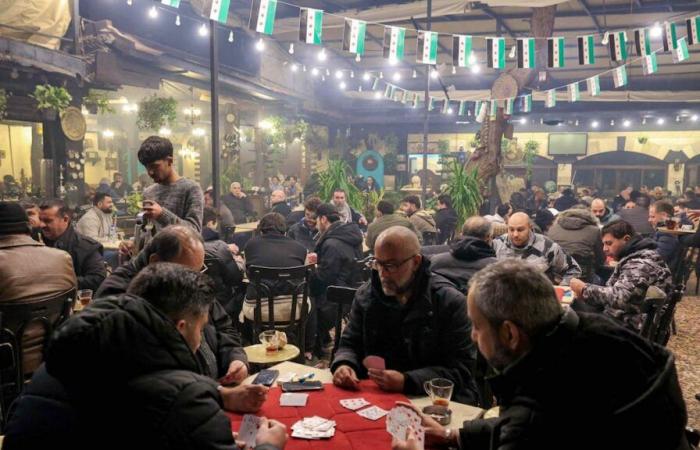After getting into the habit of whispering in the cafes of Damascus to discuss politics, Mohannad al-Katee can now speak openly with her friends, in a Syrian capital freed from the yoke of repression. “It’s the first time I’ve sat down in a café and been able to talk about politics, it was a dream for Syrians,” rejoices this 42-year-old researcher in political and social history.
In Damascus, the walls of emblematic cafes, witnesses of discussions stifled by the repression of the power of the deposed president, Bashar al-Assad, vibrate to the rhythm of political conversations. “It was forbidden under the previous regime, there was a relative opening during the Damascus Spring, but it did not last,” adds Mohannad al-Katee, sipping her tea in the al-Rawda café.
When Bashar al-Assad succeeded his father Hafez, who ruled with an iron fist, in July 2000, an unprecedented parenthesis began. He is letting go a little, political salons are flourishing and political reforms are being demanded in a country accustomed to fear and silence. But the new president returned to these achievements a few months later and the repression put an end to this ephemeral “Damascus Spring”. According to Mohannad al-Katee, “the spies were everywhere, the hookah waiter, the one you pay a bill to, it could be anyone.”
Day and night
A political activist since 1998, he fled to Saudi Arabia in 2012, a year after the start of the popular uprising which was bloodily repressed. “Political life was all about secret meetings, we were always taught that the walls have ears,” he says. From now on, “Syrians can no longer return to obscurantism and dictatorship, accept the rule of a single party,” he adds.
A little further away, in the Havana café, where activists and intellectuals met in the distant past, Fouad Obeid, 64, chats with his friend. He himself is the former owner of a café which he had to close. “The intelligence services spent their time at my house, they consumed for free as if they were at home,” he confides.
During the decades of rule of the Assad clan, the security services were real instruments of repression feared by the population. On Saturday, the new head of Syria’s intelligence services, Anas Khattab, announced that their multiple branches would be disbanded. “I was discreet so that no one knew that I was the owner, I told customers not to talk politics for fear of reprisals,” adds Fouad Obeid. Now, in Havana or elsewhere, “it’s day and night,” he says.
Truly free for the first time
At the al-Rawda café, discussions are in full swing, around a hookah and board games. The owner, Ahmad Kozoroch, can’t believe his eyes. He has seen many people get arrested in his café in the past and is happy that tongues are loosening. “I now almost only see new faces,” he rejoices: “People who had been sentenced to death, imprisoned.”
Nesrine Choubane, a 42-year-old real estate agent who meets her husband around a hookah, spent more than three years in prison for “carrying dollars”, a currency that was prohibited. She was released from Adra prison by the new authorities on December 8, the day they took power in Damascus. “We were dangled with the possibility of an amnesty” from the regime. “Thank God, the amnesty came from God,” she declares. “At the café, we didn’t dare say anything, we were even afraid of being tapped because of our phones,” confides the woman who says she feels “really free” for the first time.
Even if the new leaders come from a coalition of armed groups dominated by radical Islamists, a wind of freedom is blowing over the new Syria, where demonstrations are being organized in public squares, something unthinkable just a month ago. “We are no longer afraid. And if Jolani (Editor’s note: the new Syrian leader, Ahmad al-Chareh) makes mistakes, we will denounce them,” says Nesrine Choubane: “In any case, it can’t be worse than Bashar al-Assad.”
(afp/er)






